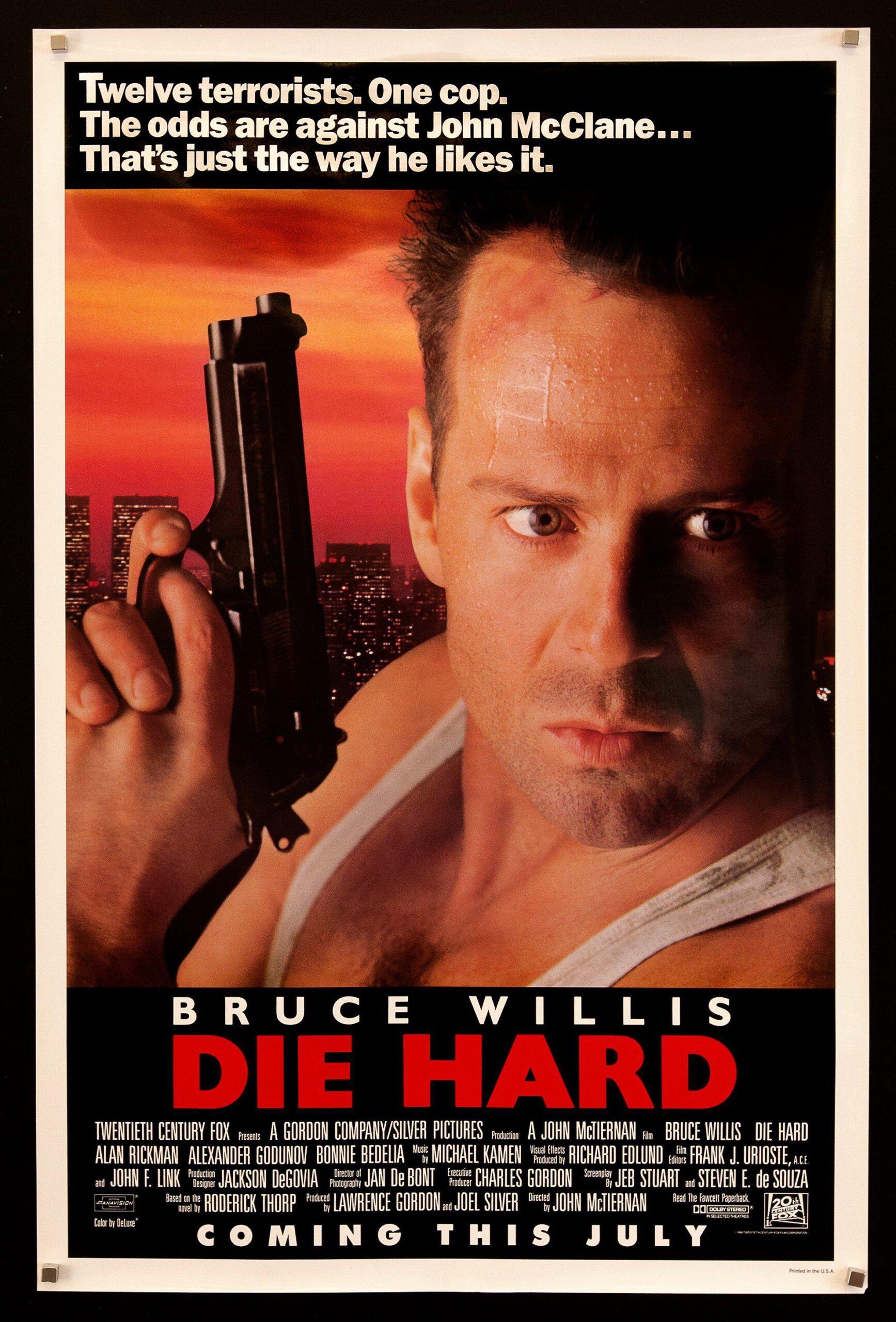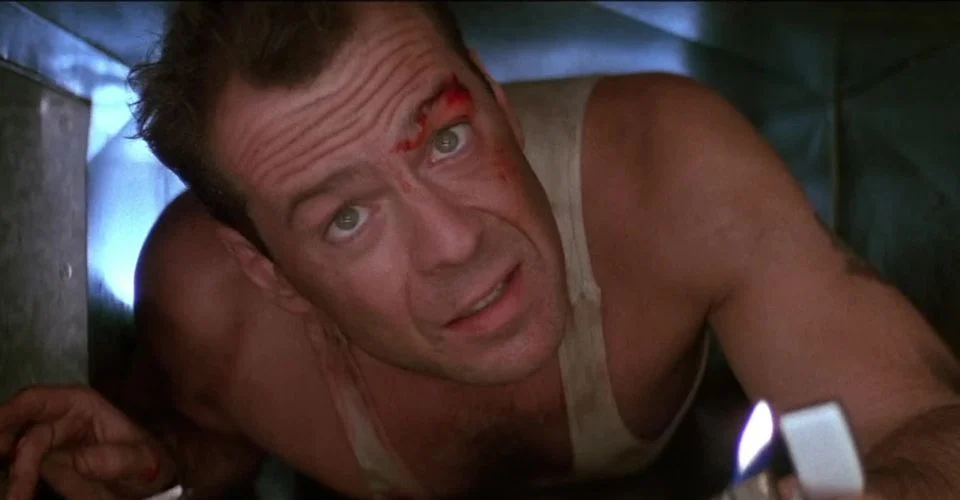Entre nous
Die Hard: Very Much Not A Christmas Movie
Before diving into the review, I would like to remark that this article is going to be a highly opinionated piece, based on a subjective point of view. Everyone is entitled to their own opinion, and this one is mine. Enjoy!
P.S.: Spoiler Alert!

I have never seen Die Hard before. The only two things I know about it is that Bruce Willis plays the main character and that it is considered to be a Christmas-action movie. Yes, you read it right. The 1988 action phenomenon is, in the eyes of many, labelled as a film scheduled to watch during the holiday season. Even though I have never seen it before, I find that extremely hard to believe. Not just because it is most often announced solely as an action movie, but because the reasons behind calling Die Hard a Christmas special are ridiculous.
The Gazette, a reputational printed and online magazine that has been established 143 years ago, names the following arguments in favour of Die Hard identifying as a Christmas movie:
- It takes place during a holiday office party.
- It has Christmas music.
- John’s wife has a Christmas-y name (Holly).
- There are presents involved.
- Santa Claus (sort of) makes an appearance.
- It snows at the end of the film.
- Statistically speaking, many households watched Die Hard on Christmas Eve in 2016, beating the viewing rates of Home Alone, Miracle on 34th Street and The Santa Clause.
I mean… I do not need an academic paper arguing for the case of labelling the film in question under the Christmas genre, but I’d require a little bit more convincing than in the above-listed points. I believe a Christmas movie earns its title with more in-depth components of its diegesis (the inner story world) than only taking place during Christmas and seeing snow fall down on the screen.
However, in order for me to build my argumentation up and be able to draw a valid value judgement on the question, I need to see Die Hard for myself first. Additionally, I am going to complete the list of The Gazette and break down what makes a Christmas movie a Christmas movie, in my perception. If you would now excuse me, I will be right back.
Two hours and eleven minutes later…
Okay. Let me just plainly state that this was a very pleasant and entertaining movie to watch. A lot of action, blood, and gore in the diegesis, performed by an acclaimed group of actors. Bruce Willis, alias officer John McClane, the protagonist and Alan Rickman (May He Rest In Peace!), aka Hans Gruber, the antagonist bring a miraculous duo onto the screen, keeping the viewer constantly on the edge of what their next step is going to be. Their dynamic is sarcastic and cynical. The story brings the viewer to an office Christmas party, where John’s wife (Holly) is working. She is expecting her husband home for the holidays when a group of highly professional thieves take over the office building and lock it down. Their goal is to break into the company vault, where 600 million American dollars are awaiting them. John, being in the bathroom during the first attack, manages to get away and go into
hiding in the building. He encounters and kills some of the thieves and claims a radio for himself, on which he can get in contact with the outside police. Sergeant Al Powell receives the order to check out the office building and then alerts the higher authorities to send backup. The other important dynamic duo that forms on screen is between Powell and John. Their conversations over the radio also summarize what is happening on screen in case the spectator would have gotten confused about the plot in the midst of all the action. Their interactions are the most honest and humane moments of the entire movie. In the end, John manages to get the hostages out of the building, including his wife, kills Hans Gruber and becomes the “hero” of the day.
One thing that stands out for me in my description of the plot, is that I barely mentioned Christmas, meaning Die Hard, for me, does not revolve around the holidays, on the first look. Yes, the occasion for the initial gathering is an office Christmas party, but it could have easily been just a monthly company event. The fact that the story takes place at Christmas time, does not influence the outcome of the movie or any of the characters’ decisions. Furthermore, Die Hard was released on July 15th back in 1988. Thus, it was not intended to be a movie to be watched during the holiday season anyway. Only based on these facts for me it would be enough to safely say that Die Hard does not, in fact, qualify as a Christmas movie. However, The Gazette’s list is longer than that, so let me examine it point by point.

It takes place during a holiday office party.
As I stated before, that is true, but it does not change or add anything to the development of the plot, hence, it is invalid regarding the argument. In a Christmas movie, the setting and theme of the holidays is the main focus and drive for action. The characters are motivated to spend time with their loved ones, which occurs in Die Hard as well, and that is supposed to be the centre of attention in the plot. The majority of Die Hard, however, presents action and plotting crime, putting the Christmas spirit as a theme completely to the side.
It has Christmas music.
Again, also a true fact. Indeed, part of Die Hard’s soundtrack includes Christmas classics like “Let It Snow” (twice), “Jingle Bells” and “Winter Wonderland”. However, every time a holiday classic comes on, the atmosphere is rather sarcastic than cosy. The purpose of Christmas music is supposed to help the spectator get into a celebratory mood, but here, it hits rather alienating than heart-warming. At the end of the film, when the bruised and injured John McClane rides away with his wife in a limo, “Let It Snow” starts playing and my initial reaction was bursting out of laughter. I am not saying that the music has to create the same desired effect every time, but, for a holiday movie, the soundtrack felt out of place this time.
The only time they put on a “Christmas song” on purpose, this piece started playing (listen till the end, it is worth it):
John’s wife has a Christmas-y name (Holly).
I was rather open-minded for this one. At first glance, this statement has no value in my opinion, but I intended to keep curiosity to see if Holly has any special “Christmas” qualities to herself beside her name. However, her character has no unique role in the diegesis besides being John’s endangered wife, who later gets rescued by none other than John himself. Ultimately, this point of The Gazette has no meaning for argumentation.
There are presents involved.
What presents, may I ask? Unless they mean the fake wrapped boxes under the tree in the office, or the surprise gunshots in several characters’ faces, I have no idea what presents they are referring to.
Santa Claus (sort of) makes an appearance.
The emphasis is on ‘sort of’ because I could not for the life of me identify a Santa Claus in this film. It could be the serial killer German Alan Rickman, the dead company CEO or Holly’s coked-up co-worker who gave up John to the thieves in no time. Jokes aside, the closest moment I could find to the presence of Santa Claus in Die Hard was the moment when John and Al Powell finally meet in person after everyone innocent made it out of the building safely. The two men exchange a heart-warming look in the middle of the panicking crowd, acknowledging the spiritual support they offered to each other in the previous hours. Al’s presence is Santa Claus-like, the music elevates his appearance above the crowd and brings a sort of peacefulness into the viewer after all the goriness of the past two hours. The peaceful moment lasts for about one and a half minutes when one of the terrorists turns out to be still alive and attacks John again, unsuccessfully, as you can see in the clip below. Ultimately, Santa Claus, in my opinion, does not make an appearance in the movie.
It snows at the end of the film.
No, it does not. Snow = Papers. Sarcastic and funny, a little twisted gag at the end of all the bloodshed, I really appreciated it. However, I am sorry, but it does not qualify as snow at Christmas time. You can see the paper fall in the clip above, as well.
Statistically speaking, many households watched Die Hard on Christmas eve in 2016, beating the viewing rates of Home Alone, Miracle on 34th Street and The Santa Clause.
I cannot argue with statistics. I would just like to ask then, why did The Gazette take the viewing rates from 2016 and not 1988? What happened to the previous 28 years’ Christmas rates? Anyhow, my point is that once the viewers themselves choose to watch a movie at a certain time, out of personal traditions, if the movement becomes worldwide, it can overwrite directorial intentions. Just like Harry Potter became a Christmas tradition in many households even though it includes Christmas only once in the plot per movie. So, I will give this one to The Gazette.
Ironically, now that I have gone over The Gazette’s points of argumentation, I realize that I myself found a new one in favour of Die Hard being a Christmas movie, maybe the most convincing one for me, that was left out of the list. The film includes a key component to a holiday movie, namely a Christmas miracle. At several points in the story, some sort of miracle is needed for the characters to reach their desired goal. Let that be Alan Rickman wanting to get into the seven-door vault or Bruce Willis barely surviving against the thieves and needing one last push of energy to save Holly and make it out alive.
In each case, the miracles are kind of based on coincidence. The wonder does happen but based on pure luck or genius logic. Santa’s elves or Rudolph’s shiny nose had nothing to do with them this time. This element perfectly describes the Christmas irony that is embedded in Die Hard. It employs the holiday spirit and vocabulary to sugar-coat the intensity of the brutal actions happening on screen, making it even a little bittersweet to watch. For this exact purposeful motivation, I declare Die Hard not a Christmas movie. It contradicts the original message of an actual Christmas movie. The Christmas spirit is not supposed to make you feel alienated, cynical, or bittersweet. It is supposed to pull you in, make you feel unconditional love and empathy, and make you want to try to sit under the (sometimes non-existent) chimney in your home and wait for Santa Claus to fall over you with all the presents. It should make you feel like you don’t care who’s naughty or nice, you just want to be together with your loved ones.
I understand where the claim of Die Hard being a Christmas movie comes from, but even after careful consideration, I do not see it like that. And, if I did not convince you of my point, maybe Bruce Willis will.
Yippee-ki-yay, motherfuckers and Merry Christmas!